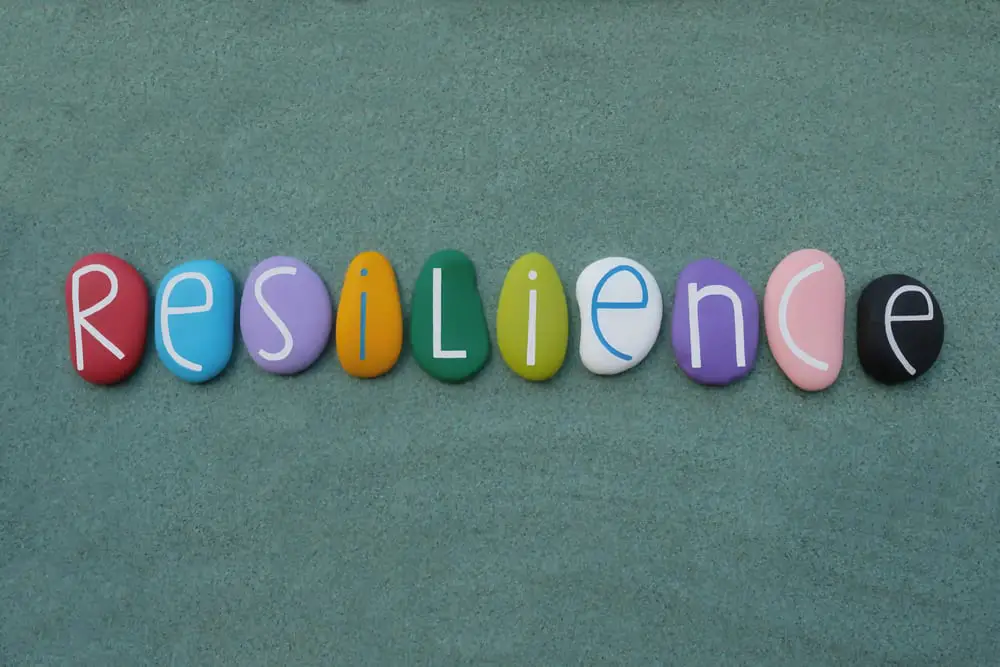Resilience: Building Mental Toughness for a Better Life
Resilience is a crucial skill that helps individuals cope with and recover from setbacks. It is the ability to endure difficult situations, manage stress, and bounce back from adversity. Resilient people have strong coping skills and are able to marshal their available resources to ask for help when needed. Rather than being victimized by a situation, resilient people find ways to manage the situation instead of allowing it to manage them.
Understanding resilience is essential for maintaining good mental health and personal growth. You can develop a sense of control over your life, reduce stress levels, and improve your ability to cope with life’s challenges. When life takes a slice out of you, resilience calls. How do you answer that call?
This fortitude involves developing skills and strategies to help you manage stress and adversity effectively. Let’s look at the concept of resilience, its role in mental health, and how to build resilience in different scenarios.
“How does it help…to make troubles heavier by bemoaning them?” – Seneca
Understanding Resilience
Definition and Significance
Resilience is a crucial trait that helps you navigate life’s challenges and emerge stronger. It is not just about being tough; it is about having the inner strength to cope with adversity and experience growth, wisdom, and insight. It’s about surviving.
Psychological resilience is a term used to describe the ability to cope with stress and adversity. It is a dynamic process that involves a range of cognitive, emotional, and behavioral responses. This buoyancy can be developed and strengthened over time.
A major benefit of being resilient is its positive impact on your mental health and well-being. People who are resilient are better equipped to handle stress and less likely to succumb to anxiety and depression. Although they may experience anxiety and depression, working through and beyond them demonstrates to them their own capability. They don’t throw in the towel because of the belief that there are no alternatives. Resilient people believe you just need to find those alternatives. Confidence comes in knowing that the right decision-making combined with perseverance can get you through most challenges in life.

“My mission in life is not merely to survive, but to thrive; and to do so with some passion, some compassion, some humor, and some style.” Resilience doesn’t have to stop at making it through the day-to-day grind with a little less trouble.”
Maya Angelou
Resilience as a Personality Trait
Resilience is often perceived as a personality trait. Some people are naturally more resilient than others, but it is important to remember that resilience is not solely determined by genetics. It can be developed and strengthened through experience and practice.
Resilient individuals tend to have certain characteristics that help them cope with adversity. These include:
- Positive outlook: Resilient people believe that they can overcome challenges.
- Flexibility: Resilient people are able to adjust to changing circumstances and find new ways to cope.
- Problem-solving skills: Resilient people are good problem-solvers. They are able to identify the root cause of a problem and come up with effective solutions.
- Social support: Resilient people have strong social support networks. They have people in their lives who they can turn to for help and support when needed.

“If you want something good, get it from yourself.” – Epictetus
Role of Resilience in Mental Health
Resilience is a crucial factor in mental health. In this section, we will explore the role of resilience in mental health and how it can impact your overall well-being.
Resilience and Stress
Stress is a common experience that can be both positive and negative. Positive stress can motivate you to achieve your goals, but negative stress can lead to mental health issues. Resilience can help you manage stress by building your coping skills and providing you with the ability to bounce back from adversity.
Self-care is one method to build resilience and manage stress. Getting enough sleep, eating a healthy diet, exercising regularly, and engaging in activities that bring you joy can fortify you. Social support is also essential in managing stress. Surrounding yourself with supportive friends and family can help you feel less alone and more capable of handling stressful situations.
“We may encounter many defeats but we must not be defeated.” Maya Angelou
Resilience and Anxiety
Anxiety is a common mental health condition that can cause intense worry and fear. Resilience can help you manage anxiety by building your self-confidence and providing you with the tools to cope with anxious thoughts and feelings.
One way to build resilience and manage anxiety is by challenging negative thoughts. Identify and question your anxious thoughts, and replace them with more positive and realistic ones. Write them down and analyze them to determine if they are valid. Seeking support from a mental health professional can also be helpful in managing anxiety.
“We are more often frightened than hurt; and we suffer more in imagination than in reality.” – Seneca
Resilience and Depression
Depression is a mental health condition that can cause persistent feelings of sadness and hopelessness. Resilient people seldom lose a sense of hope and confidence that they can overcome life’s challenges.
One route to managing depression is by practicing self-compassion. Treat yourself with kindness and understanding and seek support from a mental health professional to help you manage depression.
In conclusion, resilience plays a critical role in mental health. By building resilience, you can manage stress, anxiety, and depression, and improve your overall well-being. The expression fake it til you make it comes to mind.
Building Resilience
Here are some strategies to help you build that resilience.
Coping Strategies
Coping strategies are behaviors and actions that help you adjust and adapt to challenging situations. Cultivating proactive coping mechanisms can help you build resilience and stamina. Some examples of coping strategies include:
- Engaging in physical activity or exercise
- Practicing mindfulness or meditation
- Seeking support from friends or family
- Setting achievable goals
- Learning new skills or knowledge

Adaptability and Flexibility
What is a resilience mindset? Being adaptable and flexible is important in building resilience. When faced with a challenge, it’s important to adjust your approach to seek a solution. This may involve trying new things or taking on a different perspective. Some ways to cultivate adaptability and flexibility include:
- Being open to change and new experiences
- Taking calculated risks
- Being willing to learn from your mistakes
- Practicing problem-solving skills
Social Support and Connection
“I’m not sure if resilience is ever achieved alone. Experience allows us to learn from example. But if we have someone who loves us—I don’t mean who indulges us, but who loves us enough to be on our side—then it’s easier to grow resilience, to grow belief in self, to grow self-esteem.” Maya Angelou
How do relationships nurture resilience? Having strong social resources and support systems can help you build resilience. Connecting with others can provide emotional support, guidance, and a sense of belonging. Encouraging social support and connection might include:
- Building and maintaining positive relationships with friends and family
- Developing communication skills to express your needs and emotions effectively
- Joining groups or organizations that align with your interests or values
- Avoiding unhealthy coping strategies, such as substance abuse or social withdrawal
Resilience in Different Scenarios
“If you can’t fly then run, if you can’t run then walk, if you can’t walk then crawl, but whatever you do you have to keep moving forward.” – Martin Luther King Jr.
Resilience in the Face of Adversity
Life is full of challenges, setbacks, and unexpected events that can test your resilience. Adversity can come in many forms, such as job loss, financial difficulties, or personal tragedy. Resilience is the ability to adapt, bounce back, and recover from these setbacks. It’s important to remember that resilience is not about avoidance or denial, but rather accepting reality and taking action to deal with it.
One key to building resilience is to focus on what you can control. Instead of dwelling on the things you can’t change, focus on the actions you can take to improve your situation.
Another important aspect of resilience is acceptance. Accepting that setbacks and challenges are a natural part of life can help you develop a more positive outlook and a greater sense of control. By accepting the things you cannot change, you can focus your energy on the things you can control.
Resilience during a Pandemic
How do we measure resilience? The COVID-19 pandemic tested our resilience. From job loss and financial difficulties to social isolation and fear of illness, the pandemic presented numerous challenges to individuals and communities around the world. However, it also presented opportunities for growth and adaptation.
One key to resilience during a pandemic is flexibility. Being able to adapt to changing circumstances and find new ways to connect with others can help you maintain a sense of control and purpose. This may involve finding new ways to work or study from home, connect with others through virtual platforms, or find new hobbies and interests to pursue.
Another important aspect of resilience during a pandemic is community resilience. Building strong connections with others and supporting one another can help individuals and communities weather the storm of the pandemic. This may involve volunteering, reaching out to neighbors and friends, or joining community groups and organizations.

The Impact of Resilience on Personal Growth
When life takes a slice out of you resilience can help you grow and develop.
Turning Setbacks into Comebacks
One of the key benefits of resilience is that it allows you to turn setbacks into comebacks. When you experience a setback, whether it’s a failure, a disappointment, or a mistake, resilience helps you recover quickly and move forward. Rather than getting stuck in negative feelings or giving up, you can use your energy/resilience to bounce back and try again.
Building Emotional Intelligence through Resilience
Building emotional intelligence, which is the ability to recognize and regulate your own emotions and understand the emotions of others is a consequence of resilient behavior. When you practice resilience, you develop greater emotional regulation and problem-solving skills. Navigating difficult emotions and situations comes more easily. The result is greater empathy and compassion for others.
Resilience and Empathy
How does empathy for others build resilience? Resilience can move you to develop greater empathy, the ability to understand the feelings of others. When you practice resilience, you learn to adapt to changing circumstances, and perhaps even see adversity as a teaching moment.
When life takes a slice out of you, what is the beauty of resilience? By turning setbacks into comebacks, building emotional intelligence, and developing greater empathy, resilience can help you grow and develop as a human being.
The lyrics in Van Halen’s cheeky hit song “Jump” summarize it:
I get up, and nothin gets me down
You got it tough, I’ve seen toughness around
and I know, baby, just how you feel
You got to roll with punches and get to what’s real.

